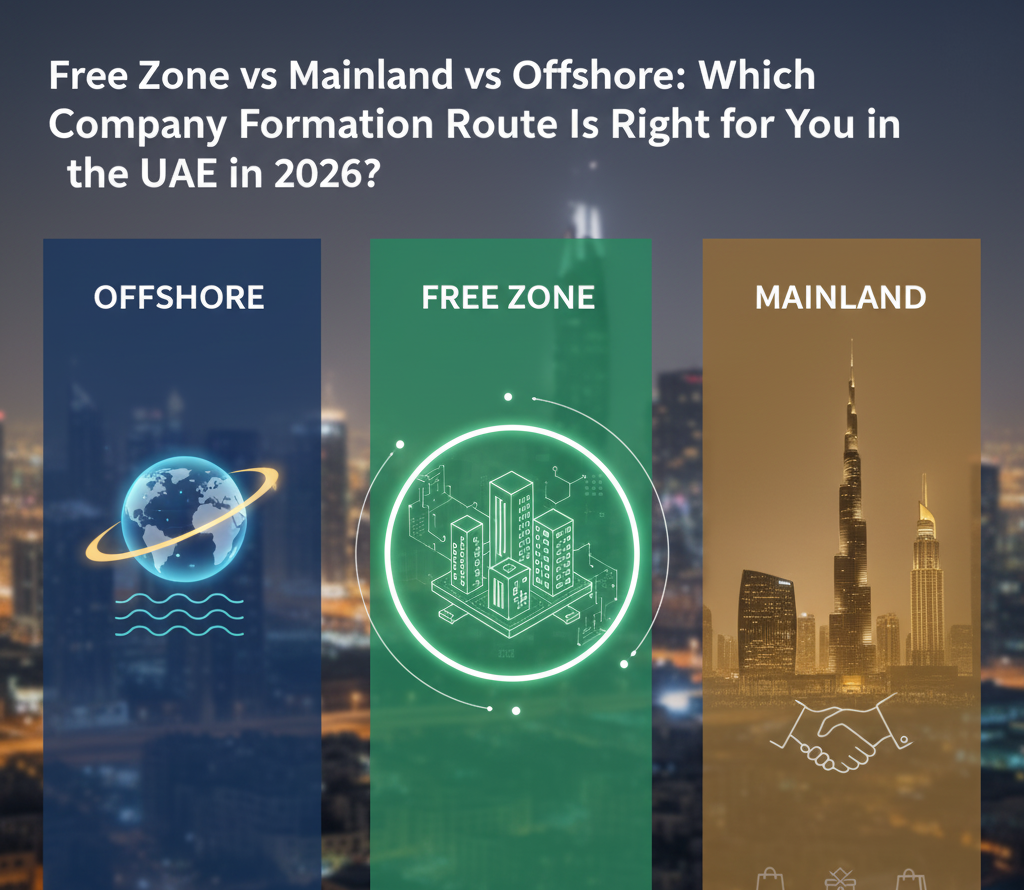Most founders enter the UAE market with one assumption: all company structures work the same.
They don’t.
And that’s where most businesses slow down before they even start.
Here’s the simple clarification: the UAE offers three distinct formation routes, Free Zone, Mainland, and Offshore, and each one shapes your licensing, tax exposure, operational reach, and long-term scalability.
Here’s what changes for you: once you understand these differences, the decision becomes precise and risk-free.
1. What does Each Structure Actually mean?
Most entrepreneurs mix these three categories, and that leads to misaligned licenses.
Here’s the clean breakdown:
- Free Zone Company
A business registered inside a designated economic zone with benefits such as 100% foreign ownership, simplified setup, and sector-specific advantages. - Mainland Company
A business licensed under the UAE Department of Economic Development (DED) that can operate anywhere inside the UAE without restriction. - Offshore Company
A non-resident entity used for holding assets, international trading, and tax-efficient structuring — without operating inside the UAE market.
Here’s the part most people miss:
Each structure has a different legal scope, and choosing the wrong one creates compliance issues later.
2. Why Choosing Correctly Matters?
Here’s where most founders slip: they choose based on cost, not compliance.
Let’s clarify this:
Your choice determines five critical areas:
- Where you can legally trade
- Whether you can hire staff inside the UAE
- Your tax treatment under the 2026 regulations
- Your office and visa requirements
- Your long-term expansion options
Here’s how you stay in control: choose based on your operational model, not just price.
3. Who Each Structure Is For?
Most applications get delayed because the criteria weren’t matched correctly at the start.
Here’s the accurate structure:
Free Zone Eligibility
- Ideal for online businesses, service providers, consultants, tech firms, creatives, and international traders
- 100% foreign ownership
- No need for a local partner
- Limited or no authority to trade directly in the UAE mainland unless using a distributor or DED licence upgrade
Mainland Eligibility
- Required for businesses selling goods/services inside the UAE directly
- Required for on-site services (construction, retail, restaurants, salons, clinics, etc.)
- Mandatory if you want unlimited access to government contracts
- No local partner required for most activities in 2026
Offshore Eligibility
- Used for asset protection, holding shares, intellectual property, or international trade
- No office required
- No visa issuance
- Not permitted to trade inside the UAE
Bottom line: eligibility is activity-driven, not opinion-driven.
4. Documents You Need for Each
To avoid delays, prepare these early.
Free Zone Documentation
- Passport copy
- Passport-size photo
- Business activity selection
- Application form
- Optional: business plan (zone-specific)
Mainland Documentation
- Passport copy
- Emirates ID (if applicable)
- Ejari (office or flexi desk)
- Initial approval form
- Activity selection
- MoA drafting (for specific activities)
Offshore Documentation
- Passport copy
- Proof of address
- Bank reference letter
- Application form
- Shareholder/Director details
Here’s what ensures a smooth approval: accurate documents submitted in the correct sequence.
5. How the Setup Works
Here’s where most founders get stuck: the process varies across jurisdictions.
Free Zone Setup
- Select the zone
- Choose activities
- Submit application
- Receive licence
- Open a corporate bank account
- Apply for visas (optional)
Mainland Setup
- Choose activities under DED
- Secure office space (Ejari)
- Obtain initial approval
- Draft MoA (if required)
- Submit documents
- Receive licence
- Apply for visas
- Complete establishment card
Offshore Setup
- Choose jurisdiction (JAFZA, RAK ICC, Ajman Offshore)
- Submit documents
- Conduct due diligence
- Receive the incorporation certificate
- Open a corporate bank account (international or UAE)
This sequence reduces approvals, rejections, and resubmissions.
6. Special Cases Most Founders Ask About
Here’s what usually creates confusion, so let’s simplify it:
Foreign-Owned Startups
Yes, 100% foreign ownership is permitted across the Free Zone and most Mainland activities.
E-Commerce Businesses
The Free Zone is usually more cost-efficient, but the Mainland is required if you want fast local delivery, warehousing, or on-the-ground operations.
SMEs With Limited Budget
Free Zones offer lower cost, but the Mainland provides wider operational access.
Choose based on where your customer lives, not on the price tag.
International Expansion
Offshore structures are best suited for holding shares, protecting assets, and facilitating global trading.
Here’s what changes everything: your business model determines the jurisdiction — not the other way around.
7. FAQs
1. Which is best for beginners?
Free Zone, if your customers are outside the UAE or mostly online.
2. Can I upgrade from Free Zone to Mainland later?
Yes, by obtaining a Mainland licence and restructuring your operations.
3. Which structure is cheapest?
Generally, a Free Zone, but cost should not override compliance.
4. Can Offshore companies open UAE bank accounts?
Yes, depending on bank policy and due diligence.
5. Do Free Zones offer 0% corporate tax?
Some qualify, but only if activities meet the qualifying income criteria.
6 . How long does setup take?
Free Zone: 1–5 days
Mainland: 3–7 days
Offshore: 3–10 days





